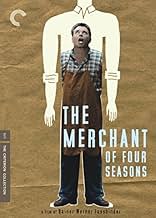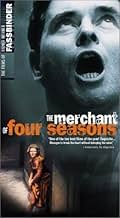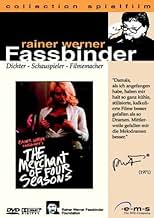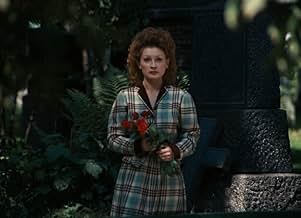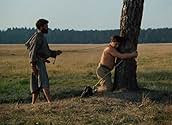IMDb RATING
7.3/10
5.5K
YOUR RATING
Hans Epp is a self-destructive man who lives a dissatisfied life. He tries to find meaning as a fruit vendor, but a heart attack impedes his ability to work, which turns his dissatisfaction ... Read allHans Epp is a self-destructive man who lives a dissatisfied life. He tries to find meaning as a fruit vendor, but a heart attack impedes his ability to work, which turns his dissatisfaction into despair.Hans Epp is a self-destructive man who lives a dissatisfied life. He tries to find meaning as a fruit vendor, but a heart attack impedes his ability to work, which turns his dissatisfaction into despair.
- Director
- Writer
- Stars
- Awards
- 3 wins & 5 nominations total
Walter Sedlmayr
- Fruit cart salesman
- (as Walther Sedlmayer)
El Hedi ben Salem
- The Arab
- (as Salem El Heïdi)
- Director
- Writer
- All cast & crew
- Production, box office & more at IMDbPro
Featured reviews
About a man who lives life in a permanent crisis, don't we all these days - captured through portraits and pictures that could stand by themselves in any art gallery. A work of genius by a genius.
In Fassbinder's earlier films, his ideas sometimes surpased his ability to execute them. He was always a great writer, but it took him some time to get his style of camera work and storytelling down pat.
The Merchant of Four Seasons is one of Fassbinder's first movie to make great use of color, from the bright green pears in the merchant's cart to the bright red roses at the funeral (a funeral in a Fassbinder movie? who'd have thought).
His camera work was getting there too, but it was still fairly minimalist. The occasional zooms seem a bit uncomfortable at times and unnatural, but then again, Fassbinder was still coming out of his purely avant garde phase. This might be because Michael Ballhaus isn't behind the camera, but instead the slightly inferior Dietrich Lohmann.
Still, this is Fassbinder, and you get your fix here. Broken dreams shown so vividly and unflinchingly as to alienate audience and drive them into a depressed stupor. Just what the doctor ordered. An early classic that shows remarkable progression when compared to his first films released only 2 years prior.
The Merchant of Four Seasons is one of Fassbinder's first movie to make great use of color, from the bright green pears in the merchant's cart to the bright red roses at the funeral (a funeral in a Fassbinder movie? who'd have thought).
His camera work was getting there too, but it was still fairly minimalist. The occasional zooms seem a bit uncomfortable at times and unnatural, but then again, Fassbinder was still coming out of his purely avant garde phase. This might be because Michael Ballhaus isn't behind the camera, but instead the slightly inferior Dietrich Lohmann.
Still, this is Fassbinder, and you get your fix here. Broken dreams shown so vividly and unflinchingly as to alienate audience and drive them into a depressed stupor. Just what the doctor ordered. An early classic that shows remarkable progression when compared to his first films released only 2 years prior.
I didn't find this film as accessible as 'Fox & his Friends' but it was a moving portrayal of a typical Fassbinder victim figure, the eponymous barrow-boy, Hans Epp, whose hopes and dreams are eventually crushed by stultifying conformity (family & society). Some of the scenes are exaggerated (the family confrontations) but I particularly liked the sequence where Hans is desperately searching for meaning & comfort; he tries to find some peace in natural surroundings, goes back to his first lost love in order to recapture past feelings (she's only interested in a quick fling before her husband returns) and visits his sister, perhaps the only person who has any degree of sympathy for him, only to find she's too busy with work.
A poignant story of a vulnerable inarticulate man crushed by his mundane surroundings and bourgeoise, middle-class German values obsessed with economic success and a upward mobility that conveniently papers over the cracks of its more disturbing past.
A poignant story of a vulnerable inarticulate man crushed by his mundane surroundings and bourgeoise, middle-class German values obsessed with economic success and a upward mobility that conveniently papers over the cracks of its more disturbing past.
If I squint, I can see the influence of Douglas Sirk on this Rainer Werner Fassbinder soaper about fruitseller Hans Hirschmüller. He's cast as a failure, because he doesn't live up to the middle-class aspirations of his family. He runs away and joins the Foreign Legion. He returns and joins the police, but is kicked out for consorting with a prostitute. His one true love can't marry him because of his work, although she meets him for assignations. In between, he has a shrewish wife in Irm Hermann, in-laws who despise him, a heart attack, and his gradual erasure from his own life to contend with.
However, while Sirk's most famous work in the 1950s tinges his disapproval of the post-war middle class with sympathy and wonderment at peoples' refusal to admit what they want to to be happy, Fassbinder seems angry and contemptuous of his subjects. Hirschmüller is too passive, Miss Miss Hermann plays the victim card too aggressively, his family arrant, mealy-mouthed snobs, and so forth. There's no one to root for in this. There's nothing tragic about his inevitable destruction, only a sadistic, scolding examination of all that Fassbinder finds wrong with mainstream society.
However, while Sirk's most famous work in the 1950s tinges his disapproval of the post-war middle class with sympathy and wonderment at peoples' refusal to admit what they want to to be happy, Fassbinder seems angry and contemptuous of his subjects. Hirschmüller is too passive, Miss Miss Hermann plays the victim card too aggressively, his family arrant, mealy-mouthed snobs, and so forth. There's no one to root for in this. There's nothing tragic about his inevitable destruction, only a sadistic, scolding examination of all that Fassbinder finds wrong with mainstream society.
What kind I say about this movie. well for starters, I thought that this film was okay, not the greatest not worst. I said this cause I thought that the script was great and original, really different and refreshing. Now I wouldn't say that it's the greatest film that I've seeing cause of the acting. The actors that played each role, seems that they played them without emotions, as if they took the life out of them. When the wife laughed or cried, this didn't look real to me for some reason, that's just an example, but sincerely all the characters didn't act real at all. I wish I could say more positive things about this film so you guys can see it at least once but how can I do that since I know that I'm not going to see this movie again. I rented this film from the library of my school, without hearing anything about the film itself or the director. I took a chance because the story that was describe on the back sounded really interesting and it really was.
Did you know
- TriviaAndrea Schober's debut.
- ConnectionsFeatured in Sehnsucht nach Sodom (1989)
- How long is The Merchant of Four Seasons?Powered by Alexa
Details
- Release date
- Country of origin
- Languages
- Also known as
- The Merchant of Four Seasons
- Filming locations
- Production company
- See more company credits at IMDbPro
Box office
- Budget
- DEM 325,000 (estimated)
- Gross US & Canada
- $8,144
- Opening weekend US & Canada
- $11,623
- Feb 16, 2003
- Gross worldwide
- $8,158
Contribute to this page
Suggest an edit or add missing content



